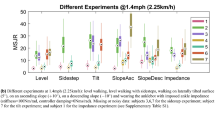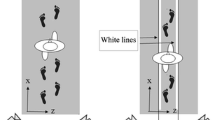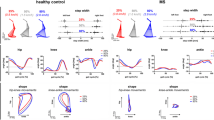Abstract
Post-stroke locomotion is usually characterized by asymmetrical gait patterns, compensatory movements of trunk and nonparetic limb, altered motor coordination, and wide inter-stride variability. This pilot study was designed to test a twofold hypothesis: post-stroke survivors can exploit the redundancy of the segmental angles to stabilize the 3D footpath trajectory during the swing phase, in accordance with the Uncontrolled Manifold (UCM) theory; an intense rehabilitative treatment improves both motor performance and outcomes of the UCM analysis. Ten stroke survivors underwent two evaluation sessions, before and after a conventional multidisciplinary intensive rehabilitation program, encompassing clinical tests and gait analysis, both overground and on treadmill. In addition, the UCM analysis was implemented to investigate whether variance of segmental angles is structured to minimize the inter-stride variability of the 3D footpath during the swing phase of treadmill locomotion. Both clinical and spatio-temporal parameters improved after the treatment, even if the statistical significance was reached for a limited set of them. The UCM analysis suggested that post-stroke survivors exploit the redundancy of lower limbs segmental angles mainly during the late swing, without significant differences between affected and unaffected sides. Thereafter, the main significant effects of the rehabilitative treatment consisted in strengthening the synergistic organization of the redundant segmental angles involving a more accurate control of the 3D footpath. Concluding, the UCM theory can be a promising tool to appraise the effects of a specific rehabilitative protocol on motor coordination in post-stroke survivors.




Similar content being viewed by others
Data availability
The datasets recorded during and/or analysed during the current study are available from the corresponding author on reasonable request.
References
Balaban B, Tok F (2014) Gait disturbances in patients with stroke. PM&R 6:635–642. https://doi.org/10.1016/j.pmrj.2013.12.017
Balasubramanian CK, Neptune RR, Kautz SA (2009) Variability in spatiotemporal step characteristics and its relationship to walking performance post-stroke. Gait Posture 29:408–414. https://doi.org/10.1016/j.gaitpost.2008.10.061
Bell AL, Pedersen DR, Brand RA (1990) A comparison of the accuracy of several hip center location prediction methods. J Biomech 23:617–621
Berg KO, Wood-Dauphinee SL, Williams JI, Maki BE (1991) Measuring balance in the elderly: validation of an instrument. Can J Public Health 83:s7–s11
Black DP, Smith BA, Wu J, Ulrich BD (2007) Uncontrolled manifold analysis of segmental angle variability during walking: preadolescents with and without down syndrome. Exp Brain Res 183:511–521. https://doi.org/10.1007/s00221-007-1066-1
Carlsöö S, Dahlöf AG, Holm J (1974) Kinetic analysis of the gait in patients with hemiparesis and in patients with intermittent claudication. Scand J Rehabil Med 6:166–179
Cho K, Yu J, Rhee H (2015) Risk factors related to falling in stroke patients: a cross-sectional study. J Phys Ther Sci 27:1751–1753. https://doi.org/10.1589/jpts.27.1751
Collen FM, Wade DT, Bradshaw CM (1990) Mobility after stroke: reliability of measures of impairment and disability. Disabil Rehabil 12:6–9. https://doi.org/10.3109/03790799009166594
Davis RB (1997) Reflections on clinical gait analysis. J Electromyogr Kinesiol 7:251–257 (S1050641197000084 [pii])
Dingwell JB, Cusumano JP (2010) Re-interpreting detrended fluctuation analyses of stride-to-stride variability in human walking. Gait Posture 32:348–353. https://doi.org/10.1016/j.gaitpost.2010.06.004
Dingwell JB, Cusumano JP (2015) Identifying stride-to-stride control strategies in human treadmill walking. PLoS ONE. https://doi.org/10.1371/journal.pone.0124879
Dingwell JB, Cusumano JP, Cavanagh PR, Sternad D (2001) Local dynamic stability versus kinematic variability of continuous overground and treadmill walking. J Biomech Eng Trans Asme 123:27–32. https://doi.org/10.1115/1.1336798
Dingwell JB, John J, Cusumano JP (2010) Do humans optimally exploit redundancy to control step variability in walking? Plos Comput Biol. https://doi.org/10.1371/journal.pcbi.1000856
Donelan JM, Kram R, Kuo AD (2002) Mechanical work for step-to-step transitions is a major determinant of the metabolic cost of human walking. J Exp Biol 205:3717–3727
Folstein MF, Folstein SE, Mchugh PR (1975) Mini-mental state examination. J Psychiatr Res 12(3):77–85
Franchignoni F, Horak F, Godi M, Nardone A, Giordano A (2010) Using psychometric techniques to improve the balance evaluation systems test: the mini-BESTest. J Rehabil Med 42:323–331. https://doi.org/10.2340/16501977-0537
Franchignoni F, Godi M, Guglielmetti S, Nardone A, Giordano A (2015) Enhancing the usefulness of the mini-bestest for measuring dynamic balance: a rasch validation study. Eur J Phys Rehabil Med 51:429–437
Gaviria M, Angeli MD, Chavet P, Pelissier J, Peruchon E, Rabischong P (1996) Plantar dynamics of hemiplegic gait: a methodological approach. Gait Posture 4:297–305. https://doi.org/10.1016/0966-6362(95)01055-6
Hak L, Houdijk H, van der Wurff P, Prins MR, Mert A, Beek PJ, van Dieen JH (2013) Stepping strategies used by post-stroke individuals to maintain margins of stability during walking. Clin Biomech (bristol, Avon) 28:1041–1048. https://doi.org/10.1016/j.clinbiomech.2013.10.010
Hof AL, Gazendam MG, Sinke WE (2005) The condition for dynamic stability. J Biomech 38:1–8. https://doi.org/10.1016/j.jbiomech.2004.03.025
Inzitari D, Carlucci G (2006) Italian stroke guidelines (SPREAD): evidence and clinical practice. Neurol Sci 27(Suppl 3):S225-227. https://doi.org/10.1007/s10072-006-0622-y
Kao PC, Srivastava S (2018) Mediolateral footpath stabilization during walking in people following stroke. PLoS ONE 13:e0208120. https://doi.org/10.1371/journal.pone.0208120
Kao PC, Dingwell JB, Higginson JS, Binder-Macleod S (2014) Dynamic instability during post-stroke hemiparetic walking. Gait Posture 40:457–463. https://doi.org/10.1016/j.gaitpost.2014.05.014
Kollen B, Kwakkel G, Lindeman E (2006) Time dependency of walking classification in stroke. Phys Ther 86:618–625. https://doi.org/10.1093/ptj/86.5.618
Krishnan V, Rosenblatt NJ, Latash ML, Grabiner MD (2013) The effects of age on stabilization of the mediolateral trajectory of the swing foot. Gait Posture 38:923–928. https://doi.org/10.1016/j.gaitpost.2013.04.023S0966-6362(13)00214-2[pii]
Lauziere S, Betschart M, Aissaoui R, Nadeau S (2014) Understanding spatial and temporal gait asymmetries in individuals post stroke. Int J Phys Med Rehabil 2:201
Linacre JM, Heinemann AW, Wright BD, Granger CV, Hamilton BB (1994) The structure and stability of the functional independence measure. Arch Phys Med Rehabil 75:127–132. https://doi.org/10.5555/URI:PII:0003999394903840
Lofrumento M, Picardi M, Monaco V, Micera S, Corbo M, Tropea P (2019) Assessment of motor coordination in stroke patients using UCM theory. Gait Posture 74:24
Mahon CE, Farris DJ, Sawicki GS, Lewek MD (2015) Individual limb mechanical analysis of gait following stroke. J Biomech 48:984–989. https://doi.org/10.1016/j.jbiomech.2015.02.006
Monaco V, Tropea P, Rinaldi LA, Micera S (2018) Uncontrolled manifold hypothesis: organization of leg joint variance in humans while walking in a wide range of speeds. Hum Mov Sci 57:227–235. https://doi.org/10.1016/j.humov.2017.08.019
Monaco V, Aprigliano F, Lofrumento M, Martelli D, Micera S, Agrawal S (2021) Uncontrolled manifold analysis of the effects of a perturbation-based training on the organization of leg joint variance in cerebellar ataxia. Exp Brain Res 239:501–513. https://doi.org/10.1007/s00221-020-05965-x
Papi E, Rowe PJ, Pomeroy VM (2015) Analysis of gait within the uncontrolled manifold hypothesis: stabilisation of the centre of mass during gait. J Biomech 48:324–331. https://doi.org/10.1016/j.jbiomech.2014.11.024S0021-9290(14)00612-5[pii]
Podsiadlo D, Richardson S (1991) The timed “up & go”: a test of basic functional mobility for frail elderly persons. J Am Geriatr Soc 39:142–148. https://doi.org/10.1111/j.1532-5415.1991.tb01616.x
Revzen S, Guckenheimer JM (2012) Finding the dimension of slow dynamics in a rhythmic system. J R Soc Interface 9:957–971. https://doi.org/10.1098/rsif.2011.0431rsif.2011.0431[pii]
Rosenblatt NJ, Hurt CP, Latash ML, Grabiner MD (2014) An apparent contradiction: increasing variability to achieve greater precision? Exp Brain Res 232:403–413. https://doi.org/10.1007/s00221-013-3748-1
Shafizadeh M, Wheat J, Kelley J, Nourian R (2019) Stroke survivors exhibit stronger lower extremity synergies in more challenging walking conditions. Exp Brain Res 237:1919–1930. https://doi.org/10.1007/s00221-019-05560-9
Srivastava S, Kao PC, Reisman DS, Higginson JS, Scholz JP (2016) Coordination of muscles to control the footpath during over-ground walking in neurologically intact individuals and stroke survivors. Exp Brain Res 234:1903–1914. https://doi.org/10.1007/s00221-016-4593-9
Stoquart G, Detrembleur C, Lejeune TM (2012) The reasons why stroke patients expend so much energy to walk slowly. Gait Posture 36:409–413. https://doi.org/10.1016/j.gaitpost.2012.03.019
Toney ME, Chang YH (2016) The motor and the brake of the trailing leg in human walking: leg force control through ankle modulation and knee covariance. Exp Brain Res 234:3011–3023. https://doi.org/10.1007/s00221-016-4703-8
Wagner LM, Phillips VL, Hunsaker AE, Forducey PG (2009) Falls among community-residing stroke survivors following inpatient rehabilitation: a descriptive analysis of longitudinal data. BMC Geriatr 9:46. https://doi.org/10.1186/1471-2318-9-46
Wu YH, Latash ML (2014) The effects of practice on coordination. Exerc Sport Sci Rev 42:37–42. https://doi.org/10.1249/JES.0000000000000002
Xu Y, Hou QH, Russell SD, Bennett BC, Sellers AJ, Lin Q, Huang DF (2015) Neuroplasticity in post-stroke gait recovery and noninvasive brain stimulation. Neural Regen Res 10:2072–2080. https://doi.org/10.4103/1673-5374.172329
Acknowledgements
The authors wish to thank all the participants enrolled in this study for their time and valuable contribution and express a special thanks to Elda Judica, MD, neurologist at CCP, for her precious help in patients’ enrolment.
Funding
The authors received no financial support for the research, authorship and publication of this article.
Author information
Authors and Affiliations
Corresponding author
Ethics declarations
Conflict of interest
The authors declare that there is no conflict of interest.
Ethics approval
The study protocol was in accordance with the Declaration of Helsinki and was approved by Local Ethical Committee: Milano Area B (approval number: 827_2018bis).
Consent to participate
All enrolled subjects provided written informed consent before starting experimental sessions.
Additional information
Communicated by Francesco Lacquaniti.
Publisher's Note
Springer Nature remains neutral with regard to jurisdictional claims in published maps and institutional affiliations.
Rights and permissions
About this article
Cite this article
Lofrumento, M., Tropea, P., Picardi, M. et al. Effects of gait rehabilitation on motor coordination in stroke survivors: an UCM-based approach. Exp Brain Res 239, 2107–2118 (2021). https://doi.org/10.1007/s00221-021-06117-5
Received:
Accepted:
Published:
Issue Date:
DOI: https://doi.org/10.1007/s00221-021-06117-5




